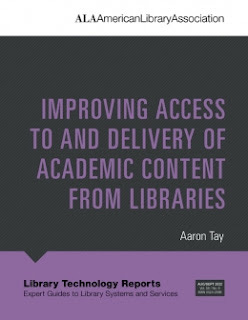Library Extension and Open Access Helper - Two unique 'new' extensions that help with checking library book and article collections
My blog usually takes the view that most of our users do not start at the library homepage as a truism and since the beginning of the blog in 2009, I have covered tools that help users "get back" to library resources or at least easily check for availability via their library catalogs or library discovery service.
The latest iteration of such tools are sometimes dubbed as Access Broker Browser Extensions, currently popular ones include Clarivate's EndNote Click (formerly Kopernio), ThirdIron's Libkey Nomad, Sage's Lean Library and the most popular of them all - Google Scholar button.
Need a formal publication to cite? You might even want to check out "Chapter 3—Making Access More Seamless with Access Broker Browser Extensions" by yours truly.
In this blog post I cover two "new" browser extensions in this class - Library extension and Open Access helper. "New" because they have been around for a while and I was aware of them but didn't investigate them closely for several reasons until recently.
Both are free and Library extension is the only legal browser extension I know that supports users finding both print and ebooks , while Open Access Helper is a rare extension that not only supports article finding at an article level but also provides proxy support at a domain level and works on iOS.
"Library extension" - A browser extension for finding books and ebooks
As your humble author is an academic librarian, I have naturally focused on support of finding journal articles, which is what all the Access Broker Browser extensions focus on.
That said, when I was testing Sage's Lean Library against ThirdIron's Libkey Nomad and Clarivate's then Kopernio with undergraduates, one feedback came through loud and clear.
They really wanted the extension to help alert them of availability of books/ebooks when they were on Amazon and similar pages.
This makes a lot of sense of course as undergraduate students particularly the freshman would be looking up recommended text and trying to decide whether to buy them. The only reason they mentioned this was at the time Lean Library did have some basic support of ebooks, with a popup appearing on pages where the extension detects a ebook available.
However, this support of ebook is far from a complete solution. This is because this ebook support is made available via Link resolver, so this is heavily reliant on the library's knowledge base to be complete with reliable metadata for ebooks and worse will not work with print books at all (important for textbooks).
Is there a solution that handles both print and ebooks? In fact, a solution does exists and it is free to boot - Library extension
Library extension isn't "new", it has been around since 2016/2017 but why haven't I covered it? Part of it is when it first launched it was for the US only for a while and I could tell the focus was on Public Libraries. Still, in July 2017, I did request for the addition of my institution (which was already on Primo at the time) but the response was while they did support Exlibris catalogues they were holding off for the moment.
I promptly forgot about this after that. Fast Forward to 2022, and one day I decided to request it again. And this time, I got an email that my institution's discovery service/catalog Primo was added.
So how does Library extension work so it can support both print and ebooks? They don't quite say it outright but it seems pretty likely they are scraping the Primo discovery service/catalogue results.
Typical workflow for the user would be
1. User searches for a book title and lands on Amazon.com, Google books, Goodreads items page
2. Library extension activates and looks for some identifier or metadata on the page, probably ISBN, title, author and searches in the background for the item from libraries you have indicated during setup.
3. The results would be overlaid on the page.
Below shows an example of a book item page on Amazon.
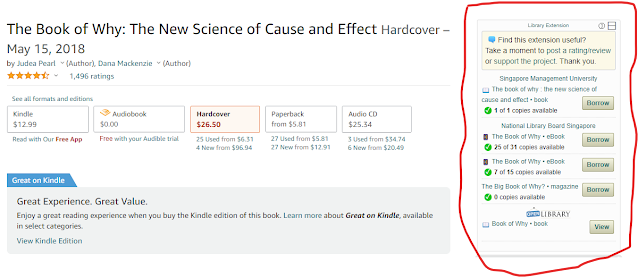
Library Extension showing availability results from the libraries I have setup
These options appear because when setting up the extension, for my own personal use case, I added my institution as well as my public library (National Library Board which has a huge Overdrive collection as well).
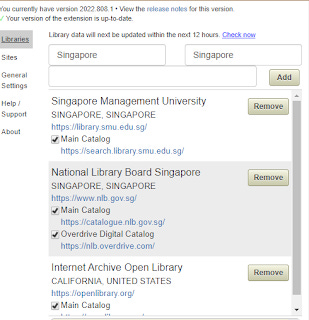
I also added the Internet Archive Open Library, which is available for anyone in the world to use. While the Internet Archive is probably most well known for the Wayback Machine, it also offers loans of digital items as long as you register for a free account.
As a sidenote, when I first looked at this extension. most of the libraries included were mostly public libraries, even today while there are a lot more academic libraries (roughly 170 with the word "University) the majority setup are in the US and UK.
I found setup quick and easy because unlike for some other extensions, you basically don't need to give any information beyond the URL of your librarie's catalog and homepage. Depending on the system your library is using, this extension may or may not be able to support it easily. But as I said, it appears Exlibris Primo systems are clearly on the supported list.
Adding new libraries to be supported is quick, because there is no need to push out a new version of the extension to the Browser extension Web Store.
Other details about this extension
This extension is available via Chrome, Firefox and Edge but not Safari. You can also play with some beta settings for example by filtering by type of item (audiobook, CD-ROM etc) but I'm not sure how accurate this function will be.
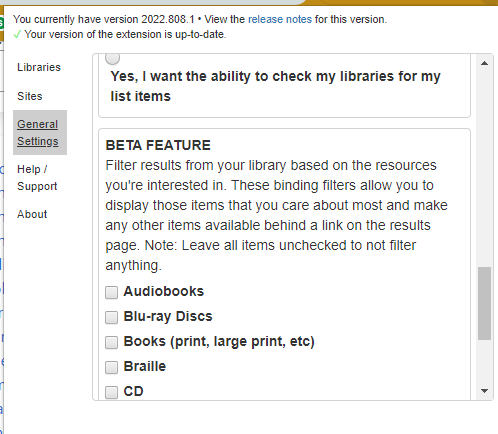
Another feature I was playing around with in the settings is choosing between display 'best' result vs "all possible matches to be displayed".
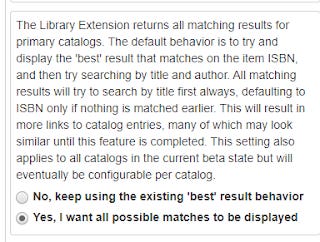
It is important to note also that this extension works on only a selected number of websites, you can check the list here but the big ones are amazon.com, books.google.com, goodreads.com, bookdepository.com etc.
When I first looked at this extension it didn't support Amazon.sg and books.google.com.sg (users in Singapore may automatically be directed to local domains), but I requested them to be added and they are now in once the extension was updated in the Extension Web Store (this happens upon every few months).
Overall evaluation
I've been testing this for over a month, and this extension is really handy. It's not perfect of course, so far I've found it may have false negatives (failing to detect an available book when available) , particularly on Google Books pages. I suspect this might be lack of metadata on those pages, since it always seems reliable on Amazon pages?
That said, this is only extension I know that supports checking for availability of print and ebooks from your library (there are illegal ones that check pirate sites), so there's isn't much choice here.
Of course, the other hard question you should ask yourself is, this extension is offered for free. What's the catch? The extension claims that they
do not track your browsing behavior. The Extension was designed to perform searches directly at your library, rather than through a middle-man, in part as a way of ensure user privacy. We do track some anonymous metrics surrounding the general use of the extension (for example, what versions of the extension are installed and which libraries are in use) as a way of ensuring we keep popular libraries working.
In any case, this is a potentially a very useful extension to look into for your library to support if it isn't already. (Check if your library is supported here)
Open Access Helper/OAhelper - A rare browser extension that supports ezproxy and link resolvers.
As an academic librarian, while I am interested in extensions that help their users find Open Access or free to read copies of papers, I tend not to recommend them if that is the only thing they do (e.g. Unpaywall, OAbutton, Core Discovery and more).
This is because my interest is in promoting solutions that also help users check and gain access to papers that they have access to via their library on top of finding OA options.
So, this means looking at things like Google Scholar button, Libkey Nomad, Lean Library, EndNote Click, Lazy Scholar etc, which not only support finding of OA content (they typically use APIs from Unpaywall, Core Discovery to do this) but also support finding of articles with institutional access.
Therefore, I mostly didn't pay attention to Open Access Helper, which looked like it was in the mold of Unpaywall etc supporting only finding of OA content.
Indeed, this is one of the functions. Below shows some of the options for sources you can use to find Open Access content.

The extension uses Unpaywall API with the option of using Core.ac.uk (basically CORE OA Discovery) and even Open Access button to find free copies.
Like Unpaywall and other similar browser extensions, it will look for metadata on article pages, usually DOIs and use the extracted metadata to check various APIs for availability. Below is the exact explanation given
I use a number of ways, but the most important is to look at the meta-tags of the page and evaluate those with the name ‘citation_doi’, ‘doi’, ‘dc.doi’, ‘dc.identifier’, ‘dc.identifier.doi’, ‘bepress_citation_doi’, ‘rft_id’, ‘dcsext.wt_doi’, ‘DC.identifier’. The app does an awful lot more, but it will almost never simply “scrape” the page for a DOI. I say almost never, as the app does exactly that for ieeexplore.ieee.org and nber.org.
This extension uses two different types of badges, one in Green and one in Orange that appear on the right side of the page, when open access content is found.
It is important to note that the colors of the badges do not refer to the well known OA colors such as Green OA = Repository.
Firstly, there is a Green badge shown below, which indicates the page you are on has the full-text. You can click on the badge to get access to the full-text.
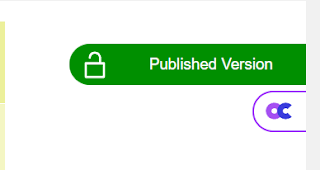
Secondly, there is a Orange badge shown below, when clicked will send you to an alternative site from where you are to get the full text.
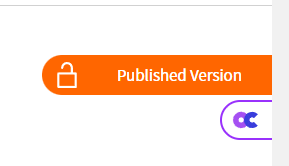
The labelling also tells you what version of the OA article is found whether it is
published version or accepted version etc.
The extension even throws in additional features like finding similar papers with a recommender and showing citation counts via OpenCitations.

Citations of paper from OpenCitations.
But the question becomes, what happens if there is no free version available? Interestingly despite the name, this extension also helps with institutional access to some degree.
Open Access Helper support for institution access
Like most extensions, you should set your extension to the library you have access to. See below.
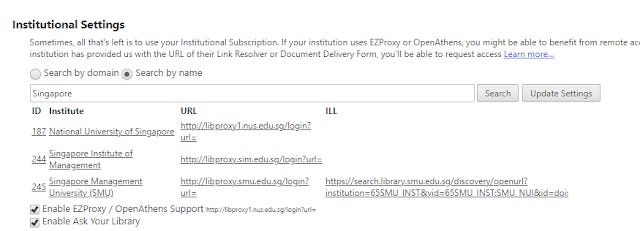
I've found that in most cases, you should be able to find your institution and add it in, but the benefit to doing that may or may not be limited.
If your library entry has no entry in the ILL column, whenever this extension is unable to find a free copy, it won't be using your link resolver to check for subscription copies.
In such a case, you will likely see something similar as below (with the right settings turned on) and you will instead by trying to use Open Access Button to try to request a free copy from the author (only for recent years).
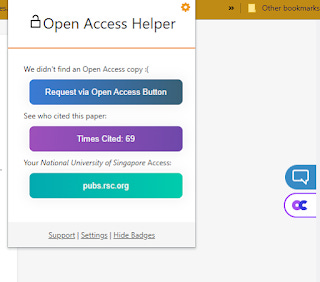
Request via Open Access Button if your institution does not have ILL/Link resolver setup
'
It is much better in such cases that you contact the developer via an online form to add your institution's link resolver settings for DOI.
Assuming you have done so and it is added, then you will see the same blue badges.
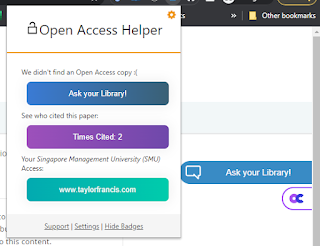
But this time, if you click on it, it will try your link resolver with the DOI it extracted from the page and you may either get access to the full text via your link resolver or in most cases be offered ILL/DDS options to buy or borrow the item (depending on your institutional settings for the link resolver).
Open Access Helper also provides EZproxy support
So the question is does it mean it is pointless to add in your library if the ILL field is blank? Not quite.
In most cases if your institution library is on the list, it means the Ezproxy function is working. But what is that?
EZproxy is by far the most popular proxy system used by libraries, but there is no reason why this function can't work for other proxy systems such as RemoteXS. Also, technically this feature also supports OpenAthens
Long before, the current style of trying to figure out metadata/PIDs such as DOIs from article pages and checking for access on an individual article basis, tools like the Proxy bookmarklet tried to help users on a per domain basis. But such a tool relied on users remembering to use it and more importantly knowing when to use it.
The next improvement on this was of course for the extension to know WHEN to proxy.
In particularly, Lean Library, began life as a tool - Utrecht University prototype that would have information on which domains could be proxied and would popup and automatically proxy the page when the user was on the appropriate domain, in theory giving access to the user (if the institution had access)
Zotero's Proxy Redirection service also basically does the same thing. Below shows the settings.
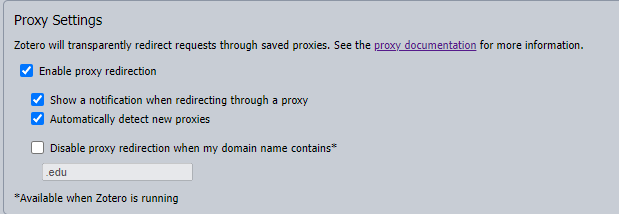
Essentially, Zotero "learns" which domains you tend to add the proxy to and offers to remember and automatically do so the next time you land on such pages. In the screenshot below it is offers to do so for Taylor and Francis pages .

If you click yes, it will give you one more chance to agree and the following popups.
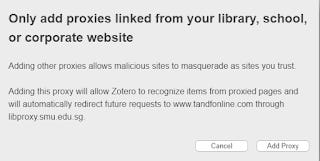
Once this is done, if you land on any page within the associated domain, Zotero will automatically redirect you to a proxy page with the yellow bar appearing with a message telling you what it did.
In the example below , even though I came from google to https://www.tandfonline.com/doi/abs/10.1080/14672710701339311, Zotero automatically proxied it for me.
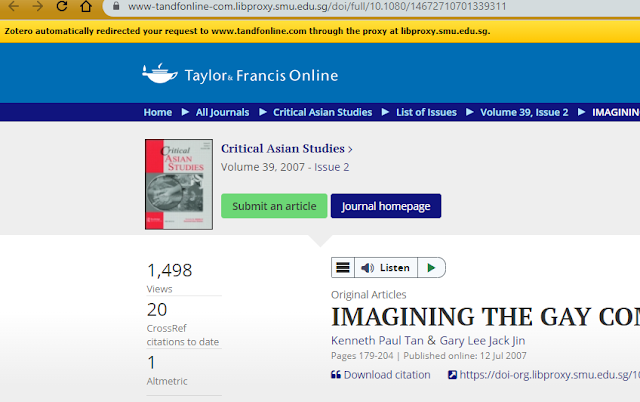
You might be thinking this is an outmoded technique now that we can check journal articles at the individual level. The problem with this thinking is that library resources span more than just journal articles. There are plenty of databases, electronic resources like citation indexes or abstract and indexing databases where auto proxy support is useful and needed.
Also, even for journal articles with full-text, certain platforms like JSTOR lack dois and other PIDs and it is extremely difficult for access broker extensions to actually do individual level checking. In such a case, a domain level ezproxy proxying might be the next best solution.
Interestingly Open Access Helper does a variant of this function when you select an institution.
Both Zotero and Lean Library are pretty in your face about doing the proxy. However, in this extension, this feature is easily missed since if you are on a domain that the extension thinks should be proxied, the extension button icon will be filled in.
What do I mean by that?
Below shows the difference between the two icons, with the top icon showing an indication that you should proxy the page.


Open Access Helper with icon filled in vs not filled in
This indication is extremely subtle and easily missed. Clicking on the extension will then attempt to proxy the site.
When I first read about this feature, I was curious about where the author of this extension got the information from. Sure, it's easy to figure out the proxy string, but maintaining a list of which domains to do it on is much harder.
While Lean Library does it by directly getting a list of domains directly from the library and Zotero extension slowly learns a list from looking at sites where you are going through a proxy, how does Open Access Helper do it?
From what I understand a lot of this is through scraping of library A-Z database lists , which may be inaccurate but as a librarian you can actually check and update the setting through instructions here.
Evaluation
This tool is free which means it doesn't have all the bells and whistles of commercial offerings like EndNote Click, Lean Library, Libkey Nomad etc, but how does it fare on the basic features of helping the users find full text?
Firstly, unlike the three tools mentioned above, assuming there is no free copy found it doesn't have any information or any way of finding out whether your institution has access to the article before the user clicks on the "Ask Library" Link.
This is a big drawback for many users.
Secondly, this extension will tend to fail to work on article pages like JSTOR which do not have DOIs. This isn't a particular problem of this extension, since Libkey Nomad and others will have the same problem.
This is where the second feature of suggesting proxing can come into play and in theory your users should use the extension to proxy JSTOR which will then give access! So this is a plus that cannot be matched by other extensions except Lean Libary.
That said, because the indication of this feature is subtle many users are going to miss this out.
Another nice feature of this tool is that it supports use on Apple iOS and Mac. Are there any browser extensions that work on mobile devices? Open Access Helper it's a rare on that does. Though obviously it does not work on Android.
Conclusion
Trying to make it easier for users to gain access to resources with the least amount of friction is an issue I have studied since the beginning of my career. Even with large amount of OA on the horizon, new technologies like Seamless Access, GetFTR this problem isn't fully solved.
If you are interested in a fairly comprehensive overview of the issue, refer to a report entitled "Improving Access to and Delivery of Academic Content from Libraries" which I wrote for Library Technology Reports in Aug/Sept 2022 issue.
